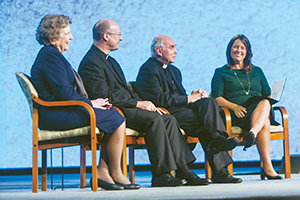By MARY ANN STEINER
DALLAS — The 2019 Catholic Health Assembly's opening session was a panel discussion about church relations, with particular focus on the clergy sexual abuse crisis and how it is affecting the credibility of the church's sponsored ministries, including Catholic health care.
The participants were Fr. J. Bryan Hehir, professor of the Practice of Religion and Public Life at Harvard University's John F. Kennedy School of Government; Sr. Carol Keehan, DC, who was until June 30 CHA's president and chief executive officer; and Bishop W. Shawn McKnight of the Diocese of Jefferson City, Mo. Kim Daniels, associate director of the Initiative on Catholic Social Thought and Public Life at Georgetown University, facilitated the conversation.

Discussing church relations are, from left, Sr. Carol Keehan, DC, Bishop W. Shawn McKnight, and Fr. J. Bryan Hehir. Session moderator Kim Daniels is at right. Sr. Carol retired as CHA's president and chief executive officer at the end of June. Bishop McKnight heads the Diocese of Jefferson City, Mo. Fr. Hehir is professor of the Practice of Religion and Public Life at Harvard University and Daniels is associate director of the Initiative on Catholic Social Thought and Public Life at Georgetown University.
Photo by Jerry Naunheim Jr./© CHA
Daniels set the context by identifying the particular crises of the last year that have rocked the Catholic faithful and marked this as a crucial moment in Catholic history: Cardinal Theodore McCarrick was expelled from the priesthood after the church determined there were credible allegations that he had sexually abused minors and seminarians; Cardinal Donald Wuerl's subsequent resignation over what he did not bring to light related to accusations of sexual abuse by clerics; the Pittsburgh grand jury report on ongoing clergy abuse over seven decades in that city; and the recent spotlight on the scandal-ridden diocese of Wheeling, W.Va. Daniels asked the panelists to address the twin crises of sexual abuse by clergy and the failures of leadership in the church.
Fr. Hehir said the first priority is to acknowledge the grievous sins against children who must be believed, protected and supported in recovery as much as possible. The second priority, he said, should be to attend to the multidimensional damage to the church and the loss of trust in its leadership. Fr. Hehir pointed out that the damage has been a painful loss not only for the community of the faithful, but also to secular society, which now holds a presumptive suspicion of the church and no longer views it as a credible bridge in secular situations.
Bishop McKnight acknowledged that the revelations of the last year have struck hard on what was already a growing sense of distrust over several generations of Catholics. Shame over numerous scandals and so many more victims is compounded by the lack of transparency, he said. Bishop McKnight said that the role of the laity has been emphasized since the second Vatican Council, but that a spirit of clericalism puts constant obstacles into the realization of the laity's vital participation at higher levels within the church.
Sr. Carol reiterated the priority is to the victims of abuse and doing whatever needs to be done to believe, respect and help heal those who have been grievously harmed. She spared no words in calling each incident of sexual abuse of minors a crime, a sin and a pastoral failure. That sin occurs among flawed humans is not a surprise, but the level of cover-ups is less explicable, she said, unless the church's image of itself is so righteous and so holy that it can't admit to failure and repent.
Flawed humanity, even a flawed church, Sr. Carol argued, does not make a flawed Gospel. We are called to believe in Jesus Christ not because the church is perfect, or our ministers are perfect, she said, but because we will find perfection only in him.
Daniels challenged the panelists to talk about what could constitute recovery and reform in light of the crisis of leadership in the church.
Fr. Hehir called for radical honesty. He said that finding a way forward may be complicated because the church in Rome and the American church do not view the issue from the same perspective. First, in the U.S., the media and attorneys general are moving forward with investigations into church malfeasance that will keep the public focused on the scandals. Second, the level of education among Catholics is high and they insist on facts, truths and intelligent explanations. Third, the democratic culture in the U.S. demands accountability and expects action will be taken much more quickly than the Vatican is accustomed to.
Fr. Hehir said U.S. bishops must act decisively, involving credible laypersons who are not afraid to challenge clerical authority in devising how to prevent future abuse and repair the church.
Bishop McKnight also expressed the need to "get it all out once and for all." While he said it would take generations to really shift the culture of clericalism, he believes there is a movement among bishops to conduct business differently, to "not only consult with the laity" but to embed them in the important conversations and work of the church at every level. The best form of evangelism for the modern age, he said, is to act quickly and honestly according to the Gospel.
Sr. Carol focused on the idea that church ministries could help lead the healing. Health care especially has experience with addressing suffering and caring for those who are the victims of violence and abuse. As a church, honesty, humility and courage about a sin, a failure, a need to make right and a way to return to the community are all needed to recover our way and reform our actions, she said. Like Fr. Hehir and Bishop McKnight, Sr. Carol expressed strong faith in the leadership of the laity in those endeavors.